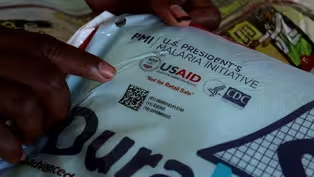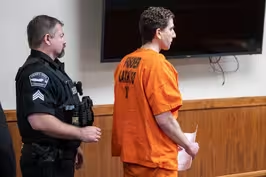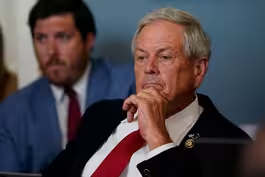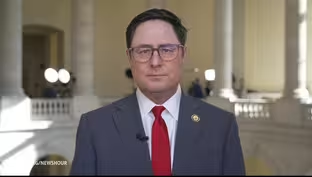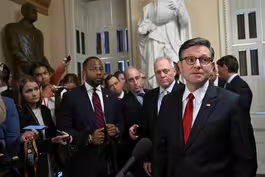
Why the jury returned a mixed verdict in the 'Diddy' trial
Clip: 7/2/2025 | 4m 40sVideo has Closed Captions
Why the jury returned a mixed verdict in the trial of Sean 'Diddy' Combs
Sean “Diddy" Combs was acquitted of sex trafficking and racketeering charges, but found guilty of prostitution offenses. The mixed verdict brings an end to one of the most closely watched trials in the country. Geoff Bennett discussed more with Moira Penza, a former assistant U.S. attorney who led the prosecution that resulted in the sex trafficking conviction of NXIVM leader Keith Raniere.
Problems playing video? | Closed Captioning Feedback
Problems playing video? | Closed Captioning Feedback
Major corporate funding for the PBS News Hour is provided by BDO, BNSF, Consumer Cellular, American Cruise Lines, and Raymond James. Funding for the PBS NewsHour Weekend is provided by...

Why the jury returned a mixed verdict in the 'Diddy' trial
Clip: 7/2/2025 | 4m 40sVideo has Closed Captions
Sean “Diddy" Combs was acquitted of sex trafficking and racketeering charges, but found guilty of prostitution offenses. The mixed verdict brings an end to one of the most closely watched trials in the country. Geoff Bennett discussed more with Moira Penza, a former assistant U.S. attorney who led the prosecution that resulted in the sex trafficking conviction of NXIVM leader Keith Raniere.
Problems playing video? | Closed Captioning Feedback
How to Watch PBS News Hour
PBS News Hour is available to stream on pbs.org and the free PBS App, available on iPhone, Apple TV, Android TV, Android smartphones, Amazon Fire TV, Amazon Fire Tablet, Roku, Samsung Smart TV, and Vizio.
Providing Support for PBS.org
Learn Moreabout PBS online sponsorshipGEOFF BENNETT: Late today, a judge denied bail from music mogul Sean "Diddy" Combs.
That's after a New York jury this morning acquitted him of sex trafficking and racketeering charges, but found him guilty of prostitution offenses.
Combs faced up to life in prison if convicted on all charges.
The jury found him not guilty of one count of racketeering conspiracy and two counts of sex trafficking by force, fraud, and coercion, but convicted him of two counts of using transportation to engage in prostitution.
For more on this case and the verdict, we are joined now by former assistant U.S. attorney Moira Penza.
Thank you for being with us.
MOIRA PENZA, Former Assistant U.S. Attorney, Eastern District of New York: Thanks for having me.
GEOFF BENNETT: So why was it so difficult to pin the more serious allegations, the sex trafficking and RICO charges, on Combs?
What did the jury have to weigh here?
MOIRA PENZA: Well, in my experience, both as a prosecutor and in private practice, juries take their responsibilities very seriously.
And these were serious charges, and they're going to follow the judges' instructions.
And so, here, what we saw is that the jury just could not find that the government had proved beyond a reasonable doubt as to those top counts, those charges, and the elements of those crimes.
And so, particularly with racketeering, what was unusual in this case is, we didn't see the government call a witness to say, I was part of the enterprise, this is what it looked like, this is how it worked, which is really a hallmark of most successful racketeering trials.
And then, on the sex trafficking piece, I think really what we saw was the jury grappling with this question of coercion and seemingly being persuaded by the defense that text messages and the ongoing relationship with Sean Combs indicated that this was not in fact coercion.
GEOFF BENNETT: Well, what was your assessment of the defense strategy here?
Because they rested after just 30 minutes, no witnesses.
The prosecution brought dozens of witnesses, as you know, with weeks of testimony.
What did you make of it?
MOIRA PENZA: You know, I think it was very interesting to contrast the defense with the prosecution in this case.
And so what I think we saw from the defense was a very clear narrative beginning to end.
And that's really important, as a trial lawyer.
And so what we saw is, from the start of opening, they had their themes.
Their themes were this was consensual and there was government overreach here.
And the other thing that we really saw the defense do is, they acknowledged the weaknesses of their case.
So, right at the outset, you heard them in opening statements say, you're not going to like my client.
He did a lot of bad things.
He's a domestic abuser.
But what the government is charging him here with is wrong.
They're basically charging him with sex trafficking and racketeering for being a bad guy.
And that's not enough.
And so what I think that the -- what the defense did was, they stuck to that very streamlined narrative throughout, whereas I think some of the weaknesses that we saw in the prosecution's case was that they weren't fronting the weaknesses as much, which is really important to do in order to maintain credibility with the jury.
And so sometimes you weren't hearing some of the worst evidence for the prosecution coming out until cross-examination.
And you weren't seeing the prosecution arm jurors with talking points to go back into the jury room and say, this is why, despite the fact that we're seeing things that look counterintuitive, that doesn't mean that he didn't commit sex trafficking because this happens in many sex trafficking cases.
And I think that was one of the big differences.
And, similarly, the prosecution bringing such a sprawling case, where they had 34 witnesses, where they had numerous predicates beyond the sex trafficking charges, I think -- I think could have backfired for the prosecution here.
And I think we may have seen a different result if it had been a more narrowly focused trial.
GEOFF BENNETT: In the 30 seconds we have left, where are the possible sentencing outcomes here?
MOIRA PENZA: So, right now, the government said that the guidelines are about five years.
He could be looking at up to 10 years per Mann Act count.
That would be relatively unusual.
But, in federal court, the judge does have wide discretion and can consider uncharged conduct, as well as even the conduct he was acquitted of.
GEOFF BENNETT: Former assistant U.S. attorney Moira Penza, thank you for joining us this evening.
MOIRA PENZA: Thank you for having me.
Ghana struggles to fight disease, poverty without U.S. aid
Video has Closed Captions
Clip: 7/2/2025 | 10m 36s | Ghana struggles to fight disease and poverty without vital U.S. aid (10m 36s)
Iran intensifying crackdown on dissent, Nobel laureate says
Video has Closed Captions
Clip: 7/2/2025 | 6m 5s | Iran is intensifying its crackdown on dissent, Nobel laureate Narges Mohammadi says (6m 5s)
News Wrap: Killer of 4 Idaho students pleads guilty
Video has Closed Captions
Clip: 7/2/2025 | 6m 9s | News Wrap: Killer of 4 Idaho students pleads guilty to murder (6m 9s)
Rep. Norman says Medicaid cut in bill is 'righting a wrong'
Video has Closed Captions
Clip: 7/2/2025 | 7m 56s | GOP Rep. Norman says Medicaid cut in Trump's bill is 'righting a wrong' (7m 56s)
Trump bill will get through this amid objections, Flood says
Video has Closed Captions
Clip: 7/2/2025 | 7m 1s | Rep. Flood says Trump's bill 'will get through this' amid some GOP objections in House (7m 1s)
What Paramount's Trump settlement means for press freedom
Video has Closed Captions
Clip: 7/2/2025 | 6m 5s | What Paramount's multi-million dollar settlement with Trump means for press freedom (6m 5s)
Where Trump's massive policy bill stands in the House
Video has Closed Captions
Clip: 7/2/2025 | 4m 14s | Where Trump's massive policy bill stands in the House as some Republicans express concerns (4m 14s)
Providing Support for PBS.org
Learn Moreabout PBS online sponsorshipSupport for PBS provided by:
Major corporate funding for the PBS News Hour is provided by BDO, BNSF, Consumer Cellular, American Cruise Lines, and Raymond James. Funding for the PBS NewsHour Weekend is provided by...
